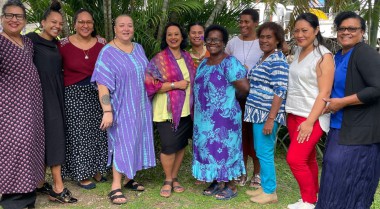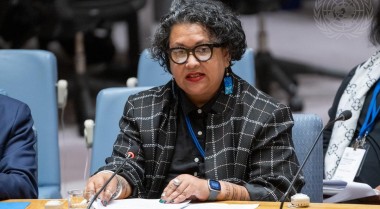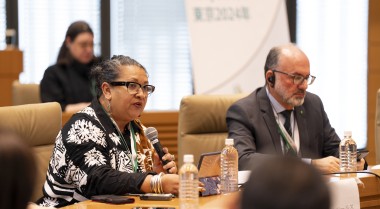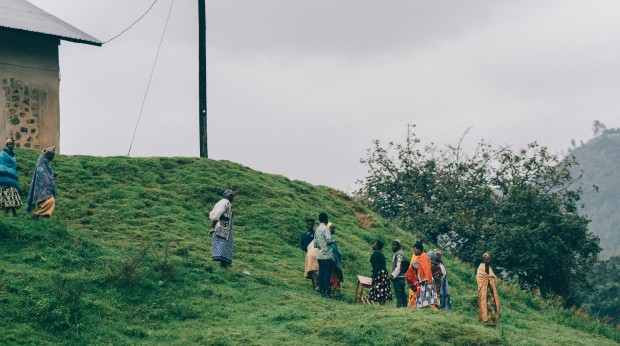
Pacific Women Mediators Network’s Statement
Calling for the support of Women Mediators Networks
Dear Ambassadors,
We write to you ahead of this year’s annual Open Debate on Women, Peace and Security (WPS) to urge you to take action to acknowledge and strengthen the role of women mediators networks in peacebuilding and sustaining peace.
The four pillars of the Women, Peace, and Security (WPS) Agenda—Prevention, Participation, Protection, Relief and Recovery—are central to the efforts of women mediator networks. These networks are key to operationalising the WPS Agenda.
Women mediators networks are critical mechanisms for sustaining peace. They 1) ensure coordinated mobilisation to support women’s meaningful participation across the Triple Nexus in a holistic and coordinated manner, enhancing complementarity, policy coherence, and coordination of diverse policy actors; 2) provide technical support and protection for women within communities and amplify voices of smaller and grassroots organisations; 3) expand peace constituencies by providing important mentorship for young women; 4) accelerate and monitor the implementation of the WPS agenda through feminist mechanisms; 5) actively contribute to peace and security efforts and advance conflict sensitivity across the Triple Nexus, fostering long-term resilience and social cohesion; 6) build strong lines of open communication between diverse women and government institutions; 7) bring traditional and indigenous leaders to become parts of the process. They amplify women’s collective strengths and resilience in the context of wars and conflicts waged by men.
There are no clear commitments in global policy to support women mediators networks. The global policy support for women mediators networks started emerging following the Global Study on WPS in 2015. The first mention of the regional women mediators networks in the UN Secretary-General’s reports on WPS dates back to 2016 (S/2016/822). In 2018, the UN Secretary-General highlighted that networks of women mediators ‘form part of a movement aimed at enhancing the influence of women throughout the duration of peace processes, from conflict analysis to preventive diplomacy, and to peacemaking and post-conflict peacebuilding and reconciliation’ (S/2018/900, para. 39). In 2023, the New Agenda for Peace called for a shift in how the international community approaches conflict prevention and peacebuilding, including some of the strongest language ever from the UN Secretary-General on the need to transform gendered power dynamics in peace and security (p. 13). However, concrete action points have yet to be clearly articulated.
We would like to take this opportunity to urge you to consider the following actions to adequately support women mediator networks in peacebuilding and sustaining peace:
- Ensure that women mediators are represented, protected, and actively participating in all aspects of the peace and security agenda. This should include regular reviews, conducted jointly with women mediator networks as part of the governance structure for the review, of regional and national policies, programs;
- Support and invest in funding mechanisms that 1) focus on addressing the highest-priority security concerns in the most effective and efficient way, and 2) conduct a comprehensive gender analysis of existing security threats. Additionally, this should involve supporting women mediator networks in participating in Track 1 processes, beyond their engagements in technical tracks.
- Ensure that women themselves shape the modalities of their engagement and participation in relevant processes.
- Provide holistic technical support, strong policies, systematic and institutionalised partnerships, and adequate and flexible feminist resourcing to regional women mediators networks. This includes supporting their access, capacities, and work of regional women mediators networks. Women mediators networks however must remain vigilant against the potential misuse of aid for geopolitical gains, supporting sovereignty and self-determination in their work.
- Reach, engage and mobilise young people, drawing upon their creativity and ability to contribute to community problem-solving and decision-making while setting clear expectations about goals and finances behind young people’s participation in the process.
- Collect evidence of the progress made by the UN system, regional organisations, and other development partners in supporting women mediator networks. The Security Council can request the UN Secretary-General to prepare a report on this matter.
The WPS agenda is not about making conflict safer for women but about investing in peace and conflict prevention. We urge you to take decisive action now to fully support women mediator networks in driving this vision forward.
Sincerely,
Members of the Pacific Women Mediators Network



